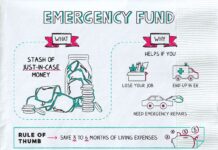If you cannot control your finances, you will not evade experiencing financial stress. You must take the proper steps to keep your finances under control. It is not easy, especially if you have a low-income job as the only source of money. However, these 10 financial tips will help you control your life.
1. Budgeting
Don’t just spend money without a proper plan. Create a budget that accounts for every income you get. Only spend your money as per your financial plan. The best way to approach this is to prioritize your expenditure and start with the most essential and unavoidable expenses. These include repaying a mortgage, paying your insurance, and paying other bills.
2. Invest Wisely
Investing in sectors that promise high returns is the best financial decision you can make to take control of your life. Real estate is a great field to channel your investment. One of the most lucrative niches in the real estate business is Mortgage Notes. You should consider finding a professional real estate mentor to guide you in the mortgage notes investment for higher returns.
3. Declutter Your Budget
Life keeps on changing. Thus, have regular checks and planning of your budget. If situations have changed, it is also important to check and review your budget and accommodate the new priorities. For example, if 30% of your income was for paying rent, buying your house means you need to reallocate that 30% since you will no longer pay rent.
4. Plan a Monthly Menu
Buying food consumes a significant portion of your income. Minding what you eat can help manage your finances and ultimately take control of your life. Planning the menu will not only control surplus food purchases but will also reduce your monthly budget. Besides, good eating habits mean you take control of various nutritional diseases such as diabetes and obesity.
5. Reduce Eating Out
Visiting that lovely restaurant and ordering the best barbecue is not recommended if you insinuate to reduce your monthly expenditure. Cooking your meals at home is cheaper than eating outside in the cafeteria and hotels. Thus, make the wise financial decision of cooking your food at home.
6. Pay Your Debts
Paying debts on time has several advantages;
- No financial stress.
- Reduces the amount paid as interest.
- Improves your credit score.
Hence, don’t delay repaying your loans, especially those with a short-term repayment period and higher interest. You can postpone other financial commitments such as acquiring a new car to first repay your previous debts.
7. Create an Emergency Fund
Financial emergencies are part of life. Anything can abruptly happen and disrupt your economic status. Think about losing your job in this era when the COVID-19 pandemic is still ravaging the economy. An emergency fund will not only help you to reduce financial distress when something unexpected happens but also save you from a total economic collapse.
8. Develop a Savings Culture
Saving is a significant financial decision that can help you control your life. Saving some of your income improves your financial situation. There are different savings options to embrace. It would help if you took your time to evaluate these options to make the best decision for your finances. Furthermore, you can save money to improve your credit score for a loan negotiation to finance your projects.
9. Improve Your Skills
Having the right skills makes you competitive at your job place. Having job security is an excellent way of improving your financial status. Thus, ensure you can improve your skills and knowledge. You can invest in your education or similar training. Enhancing your skills may also be a stepping stone to better pay by your employer.
10. Don’t Hesitate to Ask for Help
If you have financial struggles, ask for help. Financial professionals can help you make ideal financial decisions. More so, you can seek help from a support group if your financial stress becomes extreme. As Harvard Business Review states, today’s society may be materialistic, there are good people out there who are always ready to assist.
Bottom Line
Finally, take more responsibility for your finances. Track your financial progress to know if you are advancing as you would anticipate. Importantly, set realistic financial goals based on your level of income and other financial obligations.










